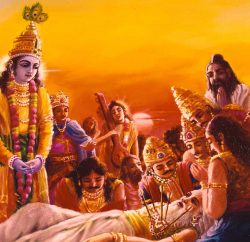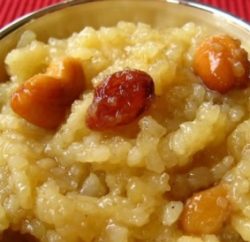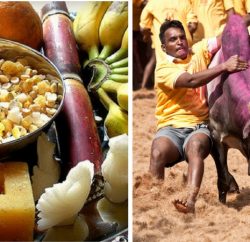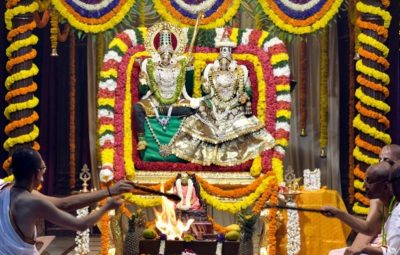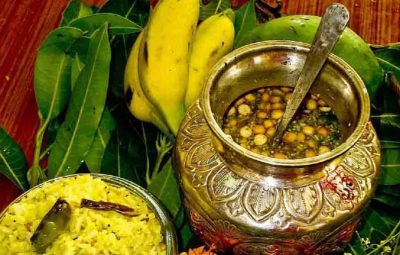
Makar Sankranti is one of the most auspicious festivals of India. This is also regarded as the beginning of an auspicious phase which marks the end of winter season and the commencement of a new harvest season. Makar Sankranti is one of the few Indian festivals which is celebrated on dates of 14th or 15th January every year.
In Bhagavad Gita (3.14), Lord Krishna says:
annād bhavanti bhūtāni
parjanyād anna-sambhavaḥ
yajṣād bhavati parjanyo
yajṣaḥ karma-samudbhavaḥ
Translation:
All living bodies subsist on food grains, which are produced from rain. Rains are produced by performance of yajña [sacrifice], and yajña is born of prescribed duties.
Makar Sankranti is an occasion to express our gratitude to the Supreme Lord for blessing us with all the necessary supplies like rain to produce a bountiful harvest. Makar Sankranti is celebrated in almost all parts of India with different names, traditions and rituals. Makar Sankranti is also known as ‘Magh Bihu’ in Assam, ‘Uttarayan’ in Gujarat, ‘Pongal’ in Tamil Nadu and ‘Maghi’ in Punjab.
Table of Contents
Celebrations across India
Makar Sankranti is regarded, important for spiritual practices and accordingly, people take a holy dip in rivers or any water bodies in case of unavailability of the holy rivers like Ganga. The early morning bathing is believed to remit from past sins. People pray to God and thank for their successes and prosperity. A shared cultural practice found across India is making rounded sweets (laddus) particularly from sesame and a sugar base such as jaggery. This sesame round sweet is a symbolism for being together in peace and joyfulness, despite the uniqueness and differences between individuals.
However, there are a few Indian states which observe this festival of Makar Sankranti with a different flavour.
Lohri & Maghi – Punjab
Lohri is a festival of Punjab observed the night before Makar Sankranti. The bonfire, Bhangra, festive foods with many Lohri songs are the major attractions.
The day of Makar Sankranti is known as Maghi. It is celebrated by eating Kheer – ‘Rauh di kheer’ which is an old dish where rice is cooked in sugarcane juice. The dish is prepared in the evening and is kept to cool. It is served on Maghi morning with red-chilly mixed curd. Also sugarcane juice, jaggery and khichdi cooked with mixed lentils are also prepared. Fairs are also held at many places on the day of Makar Sankranti.
Pongal – Tamil Nadu
Pongal is the harvest festival and also the most important festivals celebrated in Tamil Nadu. Thai Pongal, Maatu Pongal and Kaanum Pongal are the various days of the festival.
Magh Bihu – Assam
Magh Bihu, also known as Bhogali Bihu is the harvest festival celebrated in Assam during Makar Sankranti. The Makar Sankranti eve is called Uruka. On the day of Uruka, while men build bonfire or Meji in the fields using bamboo and dried banana leaves, women get ready for the next day with food items like Chira, Pitha, Laru, etc. A hut-like structure called Bhelaghar is also made, where friends and family have a feast and pass the night in the Bhelaghar, warming themselves by fire. After the feasting, on the very morning of the Makar Sankranti, the Meji is lit for the ceremonial conclusion of the year and prayers are offered to the Lord.
There are many ancient games of Assam, buffalo fighting is one of them that takes place during Makar Sankranti.
Uttarayan – Gujarat
The festival of Uttarayan is celebrated exuberantly in Gujarat and the people enjoy full days of kites flying on their terraces, winners will shout- Kai Po Che (the phrase commonly used as a victory shout while flying kites). The kite festival is held in important cities of Gujarat each year. In Gujarat, Uttarayan is regarded as one of the biggest festivals and on this day the International Kite Festival is also held. Sabarmati Riverfront is the best place to enjoy the International Kite Festival.
The auspicious Uttarayan period
Beginning from the day of Makar Sankranti, it is believed that a person who passes away during the six months starting from the festival day, that is during the period of Uttarayan reaches heaven directly and does not have a re-birth again.
These beliefs are very important aspects of Hindu scriptures and it is popularly known that during the Mahabharata war, Bhishma waited for the Uttarayan period to commence to set himself free and left this world.
Festival Recipes
India is a land of diversity. As usual, along with all the festivals, Makar Sankranti is also celebrated across India with different traditions and with it come different special food items, dishes and sweets prepared on this occasion, like Chira, Pitha, Laru, Kalagaya Kura, Multicolored sugar halwa and most popular Til Ke Laddu (sesame seeds).
Here is a link to make a few special Makar Sankranti festival recipes.
Activities associated with Makar Sankranti
Jallikattu –Bullfights
Jallikattu is a village sport and an integral part of the Mattu Pongal festival in the villages of Tamil Nadu. In this fun-ridden sport, young men have to take the money bags tied to the horns of ferocious bulls single-handedly without using arms.
Moh Juj – Buffalo Fight
Buffalo fights in Assam are held on the occasion of Magh Bihu in Nagaon, Morigaon and many other districts.
Makarvilakku
Makarvilakku is an annual festival held on Makar Sankranti at Sabarimala in Kerala. Sabarimala is an ancient temple of Ayyappan and destination of one of the largest annual pilgrimages in the world.
Makar Sankranti is widely celebrated to achieve good health, success and prosperity. Visit our temple on this auspicious day and receive the blessings of the Lord. You may also wish to donate for Makar Sankranti Seva
ISKCON Bangalore wishes you a Happy Krishna Conscious Makar Sankranti!


